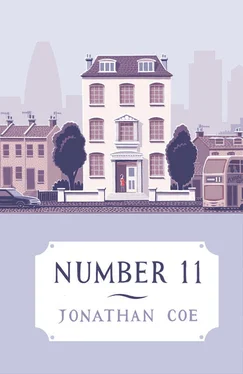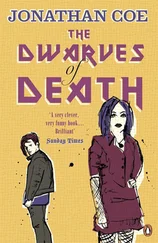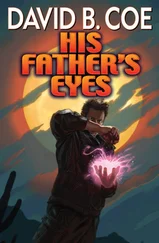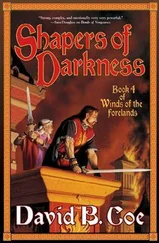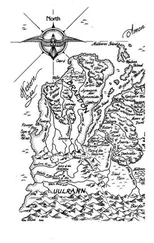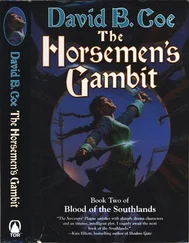At first, when he became aware that he was being watched, his reaction was surprisingly calm. He did not know where the creature had come from, or how it had crept up on him so silently, and for a moment he pondered these questions in a mood of dispassionate curiosity. It dawned on him only slowly that he was in mortal danger; and not just that, but that he was about to die in the most grotesque and unbelievable way. The eyes, the two high, widely separated, beady amber eyes, gazed at him with fixed malevolence. The creature’s legs were long and double-jointed, rising at their apex to a height taller than Freddie himself. The belly, the huge, distended belly, was covered with short hairs which in the moonlight appeared to have a greenish hue; it sagged heavily against the ground, an obscene sac containing vast, revolting liquid secrets.
The creature’s legs quivered and twitched as it readied for the pounce.
Only now did Freddie start to back towards the wall. But with the third or fourth step he tripped and fell, so that he was prone and supine as the spider advanced towards and over him, its legs thrashing and scuttling, the stomach dragging itself across Freddie’s shins, knees and thighs, then over his torso before finally settling on his face, so that the entire vile, colossal weight of the thing was pushing down on him, the stench of it, the thick, coarse texture of the body forcing the gorge up to his throat and sending him quickly, irresistibly into a swoon from which he was never to recover.
‘What a whopper!’ bellowed Grace.
‘What — a — whopper!’ echoed Sophia, at half the speed and in a much deeper voice, and, swept up by uncontrollable laughter, they both started rolling around on the playroom floor.
The credits and the title music came up on the screen all too quickly and they started shouting:
‘Oh, Rachel, can we see it again? Please, Rachel!’
‘Just the last scene, Rachel … please !’
Who would have guessed it, Rachel thought, as she rewound the DVD about three minutes. Who would have guessed that of all the things she could have shown them, it would be this terrible, creaky, inept, black and white British comedy film from the early 1960s that would send them into such paroxysms of delight, breaking down the final barriers of icy composure which they had maintained in front of her for so long? She had only bought the DVD two years ago because Laura had mentioned it to her as forming part of her researches: warning her, at the same time, that watching the whole thing would probably destroy her will to live. But the last scene, at least — or rather, the final gag — was a miracle of audacious stupidity. After ninety tedious minutes of joking around with fake Loch Ness Monsters, the real monster (itself about as dreadful an example of low-budget special effects as you could imagine) reared its plastic head out of the water and uttered the three immortal words that Grace and Sophia found so hilarious, and which they were now repeating over and over again, trying to imitate the monster’s droll, deadpan voice as they waited impatiently for the scene to restart.
‘One more time,’ she said. ‘One more time, or we’re going to be late for the train.’
It was Sunday morning, and for the second week in a row she had cancelled her regular date with Jamie. Not, this time, because she had been brusquely summoned to a foreign country to help with ten minutes’ homework. No, this time she had made the decision herself (and had arranged to see him tomorrow during the girls’ school hours instead) because she was determined to get them out of the house for the day, and to take them not to a museum, gallery or gourmet restaurant, but somewhere where they might have some mindless, uncomplicated fun. Chessington World of Adventures seemed the obvious choice. It wasn’t the easiest place to reach by train, but that in itself was part of her plan. She wanted to show them that not everybody in the country travelled in a chauffeured limousine. Other modes of transport were available.
In any case, they ended up having a glorious day. Grace’s favourite ride was the Scorpion Express; Sophia inclined towards the Rattlesnake. They both enjoyed getting soaking wet on Rameses’ Revenge, and they emerged looking pleasantly shocked, dazed and dizzy from the Dragon’s Fury. For Rachel, most of the time was spent standing with them in queues, or watching them on rides and trying to take photographs while they whizzed past on some rollercoaster or carousel. A few months ago, she would never have imagined that this was how she would choose to spend an entire Sunday. But there was a reward at the end of it, and it was a precious one: by the time they returned to Turngreet Road, the twins were more animated and talkative than she’d ever known them, and they both promised her that it had easily been the best day of their lives so far. They had loved everything about it, even the terrible junk food and the crowded, severely delayed train ride home. In fact, sitting opposite them in the packed carriage and watching the bright-eyed curiosity on their faces as they looked around at the other passengers, enthralled by the novelty of finding themselves in contact with this mass of ordinary humanity, Rachel wondered whether this hadn’t been their favourite part of all.
*
The next day she went to see Jamie in Crouch End, where he shared a house with six other students. He paid almost £200 a week, for which he was given sole occupancy of a tiny bedroom on the second floor. All the rooms in the house — including what used to be the sitting and dining rooms — had been turned into bedrooms and rented out, so Jamie rarely ventured out of his own bedroom unless it was to go down to the kitchen and make some instant coffee or microwave himself a meal. His bedroom was just about big enough to hold his single bed and the child’s dressing table which served as his desk.
‘I can only stay a couple of hours,’ Rachel said, explaining that she had to be back in Chelsea to pick the girls up from school. It was annoying, then, that Jamie proposed watching a film, and would not be talked out of it: all the more so because the film was Ghosts , Nick Broomfield’s dramatization of the Morecambe Bay cocklepickers’ tragedy of 2004, which he needed to watch for the latest chapter of his thesis.
‘Why are you always thinking about work?’ said Rachel, who after the stresses of the last week had come with an entirely different purpose in mind.
‘It’s only ninety-six minutes,’ said Jamie, checking the back of the DVD box. ‘We can do something else afterwards.’
Despite herself, Rachel could not help finding it an absorbing and upsetting film. It followed the misfortunes of a young Chinese illegal immigrant forced into ever more insecure jobs within the food industry, in order to pay back money to the ‘Snakeheads’ who had smuggled her into the UK. Rachel found that the story had a strong resonance with her memories of Lu, the Chinese worker Phoebe had looked after for a few days back in 2003. It was an odd coincidence to be watching a film that so clearly reminded her of this episode now, just when she had spent the last few days attempting to set it all down on paper. When the film was over, Jamie sat at his desk and started making notes.
‘Do you have to do that now?’ she said. ‘I’ve got to go in like … half an hour. Forty minutes tops.’
‘Just a minute,’ said Jamie. ‘There are so many things I’ll need to say about that film. Really I could start a whole new chapter about it.’
He scribbled rapidly in his notebook for another two or three minutes, his brow so furrowed with concentration that he did not even notice what Rachel was doing behind his back. When he turned to speak to her again, he found that she had stripped off her clothes and was stretched out beneath his duvet.
Читать дальше
